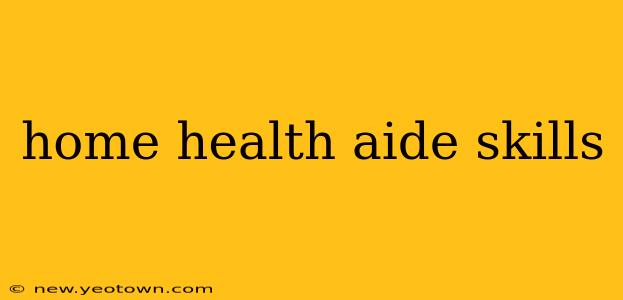Becoming a home health aide (HHA) is more than just a job; it's a calling. It's about providing compassionate care and support to individuals in the comfort of their own homes, helping them maintain their independence and dignity. But what exactly does it take? This isn't just about knowing how to change a bed or take vital signs; it's about possessing a unique blend of technical skills, soft skills, and a genuine dedication to helping others. Let's explore the essential skills that make a truly exceptional HHA.
What are the most important skills for a home health aide?
This is a question many aspiring HHAs ask, and the answer is multifaceted. It goes beyond the technical skills learned in certification programs. It encompasses the crucial human element that makes the difference between adequate care and truly exceptional care. We'll delve into those key areas:
Technical Skills:
These are the foundational skills you'll learn during your training and certification. Proficiency in these areas is non-negotiable:
- Personal Care: This includes bathing, dressing, grooming, toileting assistance, and skin care. It requires both dexterity and sensitivity to the individual's needs and preferences. Remember, maintaining dignity throughout these personal tasks is paramount.
- Mobility Assistance: Helping clients with transferring, ambulating, and using assistive devices (walkers, canes, wheelchairs) safely and effectively. This necessitates a strong understanding of body mechanics to prevent injury to both the client and the caregiver.
- Medication Reminders: While HHAs cannot administer medication, accurately reminding clients to take their prescribed medications at the correct times is a crucial responsibility.
- Vital Signs Monitoring: Accurately taking and recording vital signs (temperature, pulse, respiration, blood pressure) is essential for monitoring a client's health status and reporting any changes to the appropriate healthcare professionals.
- Meal Preparation and Feeding: Assisting clients with meal preparation, feeding, and monitoring their nutritional intake. This requires understanding dietary restrictions and preferences.
- Light Housekeeping: Maintaining a clean and safe environment for the client, including tasks such as laundry, vacuuming, and tidying up.
Soft Skills:
These are equally, if not more, important than technical skills. They are the human touch that elevates care from competent to exceptional:
- Communication: Effective communication is paramount. This means active listening, clear and concise verbal communication, and the ability to understand and respond to nonverbal cues. Patience is key when communicating with clients who may have cognitive or physical limitations.
- Compassion and Empathy: A genuine desire to help others and an ability to understand and share their feelings is essential. Showing compassion and empathy builds trust and rapport with clients and their families.
- Patience and Tolerance: Working with individuals who may have challenging behaviors or health conditions requires immense patience and tolerance. Remaining calm and understanding in stressful situations is crucial.
- Time Management and Organization: HHAs often manage multiple tasks and responsibilities. Excellent time management and organizational skills are vital for efficient and effective caregiving.
- Observation and Reporting: HHAs are often the first to notice changes in a client's condition. The ability to make accurate observations and report them promptly to the appropriate healthcare professionals is crucial for ensuring the client's safety and well-being.
- Professionalism and Ethics: Maintaining professional boundaries, respecting client confidentiality, and adhering to ethical guidelines are essential aspects of being a responsible and trustworthy HHA.
What are the daily tasks of a home health aide?
A typical day for a home health aide can vary widely depending on the client's needs. However, common tasks may include:
- Assisting with personal care tasks like bathing, dressing, and grooming.
- Helping with mobility and transfers.
- Preparing meals and providing assistance with eating.
- Monitoring vital signs and reporting any changes to the supervising nurse.
- Light housekeeping, such as laundry and tidying up.
- Providing companionship and emotional support.
- Documenting care provided in client charts.
How can I improve my home health aide skills?
Continuous learning and professional development are crucial. Consider attending workshops, taking continuing education courses, and staying up-to-date on the latest best practices in home health care.
Becoming a successful home health aide requires a unique blend of technical expertise and compassionate human skills. By mastering both, you can make a real difference in the lives of those you serve.

